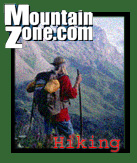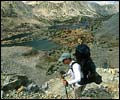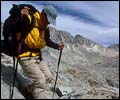
High Anxiety
Three Friends Head Out for a Post-9/11 Reality Check
Posted: December 14, 2001
PHOTO GALLERY (9 Images) |
|
We had been exchanging email for the four weeks leading up to our backpacking trip. It was about all the usual stuff: who would bring what equipment, route logistics, necessary permits, weather predictions, food, and, of course, Mr. Happy.
But, Mr. Happy was suddenly part of a trivial world that no longer existed.
"But on the morning of September 11, physical distance became an abstract concept. Who doesn't know someone who lives, or once lived, in The Big Apple?" |
|||||
At the time, the rest of us didn't know what Mr. Happy was and so you can imagine what went through our minds and where the conversation went from there. It was just one of a thousand moments of stupid humor we've enjoyed and perpetuated in the backcountry. Our upcoming trek into the Sierra Nevada was as at least as much about the desire to revert to our stupid, boyish selves for an extended weekend as it was to explore new terrain. To us the mountains have always been a source of healing and perspective, a place to relax by sweating out the occasional rough-and-tumble of every day life. For a few days, anyway, life could be taken a little less seriously.
Mark, Steve and I live 3,000 miles and, effectively, a world away, from New York and Washington D.C. But on the morning of September 11, physical distance became an abstract concept. Who doesn't know someone who lives, or once lived, in The Big Apple? Who hasn't been in a skyscraper at one time and, looking out the window, been struck by the thought, what if?
About a week passed before we started emailing about the trip again. I'm not sure what it was that kept us from discussing something as personally appealing as a trip into the mountains, but it was probably the same impetus that stopped others from going out to restaurants or movie theaters. Terrorism invaded our country; it also invaded our souls.
Our plans were still in place, but suddenly the least of our worries was now the greatest concern. Steve and Mark, who live in Seattle, were scheduled to fly on an Alaska Airlines jetliner to Sacramento, where I would pick them up and, after a short stop at my house, we would drive six hours to the South Lake trailhead just outside Bishop. But now planes were grounded indefinitely. The fallout from this was difficult to predict-would days of compounded delays keep scheduled passengers out of the skies for weeks? Would airlines go out of business? Our trip was up in the air.
Fortunately, planes began flying again within 72 hours. New security measures meant Mark and Steve had to arrive at Washington's Sea-Tac by 4am for their 6:30am flight. Wake up time then was 3am, an hour normally reserved for alpine, not airport, starts. With e-tickets and more than a little trepidation, Mark and Steve boarded their flight on time and made it to Sacramento without incident.
The drive to Bishop was a mini road trip complete with loud music, head-turning sights, expensive gas in a small town, a shortcut that actually paid off, a few wrong turns, and several emergency window rolldowns compliments of Steve, who was compounding the problem by fueling up on not one, but two enchiladas in the backseat.
We passed through Yosemite National Park on the way to Highway 395. It was Mark's first time in the park but we managed to stop only once for pictures. We had a schedule to keep if we were going to get to camp before nightfall; though historically speaking, the whole concept of "schedule" is dubious when it comes to the three of us.
After a quick stop at the White Mountain Ranger Station in Bishop for permits and required bear canisters, we wound our way up the dramatic east slope of the range via a two-lane paved access road. Our day began at or near sea level but by nightfall we would be above 11,000 feet. Steve was clearly "acclimating" better than the two of us, aided by said enchiladas. In Bishop the temperature was in the 90s, but 30 minutes later, under darkening crystal clear skies at South Lake, it was barely in the 60s.
Evidence of potential black bear trouble was everywhere at the trailhead. To make matters worse, the plastic food canisters we rented at the ranger station were pathetically small. I had been assured on the phone by a ranger that the canisters could hold and protect up to six days' worth of food. I tried to hold back the tears, knowing I was in for a few hungry days, as I left behind bag after bag of freeze-dried food. And the red pepper. And the extra Cup-o-Noodles. With the sun starting to dip below the jagged peaks of the surrounding John Muir Wilderness, we set off on foot a bit lighter than expected.
While politically active in our own ways, the three of us rarely venture into serious topics when we're together. We had avoided discussing world events thus far, and in our shortness of breath on the initial ascent we weren't about to start now. At least not out loud. As conversation ceased, thoughts turned inward. The terrorist strike was so horrific and so recent that there was no way to not think about it. For the first time we wouldn't be leaving "the city" at the trailhead as we usually do. Our shared preoccupation, though silent thus far, with events well below us mirrored the strange times in which we suddenly lived.
Traversing the lakeshore for the first half mile we brushed through a grove of Aspens with bright yellow leaves quivering in the breeze of oncoming twilight. We had to pick up the pace. Camping in Dusy Basin tonight was out of the question so our destination became the far end of Long Lake, only four miles ahead. We reached camp under a gorgeous waxing crescent moon, then broke out headlamps and quickly exchanged shorts and T-shirts for fleece, long underwear, and hats and gloves. Winter was already knocking at 11,000 feet. After a quick meal and stashing the bear canisters, we called it a night. A good sleep at elevation was crucial to our performance for the rest of the weekend.
Saturday dawned crisp and cold. Steve woke early for sunrise photos. When he returned he informed us that the lone food sack we hung the night before on a distant tree branch was done so right over a neighboring tent. Oops. Fortunately, there were no signs of bears.
We were back on the trail by 9am and heading for Bishop Pass. At just under 12,000 feet, the pass would test our sea-level lungs. We strode alongside a handful of glacial tarns that hugged the tree line. Then the path took a sharp turn to the right into a maze of steep switchbacks blasted right into the side of an imposing scree field. It was a trail-building marvel likely requiring machinery beyond flesh and bone. The imposing Inconsolable cliffs stood tall and dark to our left, blocking the sun's warmth. Open bowls of broken granite were bathed in morning alpenglow to our right. Only haggard-looking shrub and tufts of grass punctuated the otherwise rock-strewn advancing slope. From the top of the scree field we ascended a wide shoulder between two ridges, culminating at Bishop Pass. So far the lungs were up to the task. We broke for lunch with an amazing vista on the back porch of Kings Canyon National Park.
While mulling over how much not to eat in order to ration my meager food supply for the entire trip, it struck me as odd that there were so many other groups on the trail. Then it struck me as odd that I should feel oddly about it. Why shouldn't there be? It was only September. Permit quotas had been lifted for the season. This was one of the more popular backpacking spots in the Sierra.
Then I realized it was because I wondered why these people weren't at home watching the news or reading their papers. For as much as I profess to be a non-TV watcher, I had been watching a damned lot of it lately. And what I saw was addicting. First: the searing, live-action images of destruction. Seeing a plane fly into a building in a movie can be forgotten. But seeing it happen in real life... Second: America rallying in a way my relatively young eyes had never seen before-giving blood, donating money, waving flags, even praying. Watching these events on TV was America's collective way of staying involved.
So did being up here, where there are no televisions, no newsstands, no flagpoles, or no water-coolers (at least water-coolers in the traditional sense), make us non-participants? Did isolating ourselves in the mountains during national tragedy make us un-American? And had we crossed a line by doing something strictly for our own pleasure while society was reeling? I had never asked myself questions like this before. I never had to ask them before.
Savoring my lame meal of half a bagel, I gazed across the dramatic, unfolding scenery of Dusy Basin-our home for the next three days and two nights. I could only conclude what has now become a media clichè: We were being patriotic by continuing with our lives. It was absurd to think of it as anything else. It seemed our trail companions were trying to do the same, judging by all the smiles we encountered.
After descending 700 feet we made camp on a solid granite slab next to a pure blue tarn with a sandy beach at one end. To the southwest the basin dropped another 500-1000 vertical feet before once more rising to atmospheric heights several miles away. To the northeast and immediately behind us was the massive ridge swell of Mts. Winchell and Agassiz (that's right, a donut and a tennis player-well, almost), whose spiny peaks crested at just under 14,000 feet. About a quarter mile to the east stood Isosceles Peak, austere and perfectly named. Pockets of shrubs and yellow grass were the only signs of life.
Seeing everything with fresh eyes, we knew at once why this area was so lovingly embraced by the likes of John Muir, Galen Rowell, and others we admired. Camping and trekking just above tree line, we were surrounded by countless granite spires crumbling beneath an impossibly blue sky. California is not often associated with living glaciers, but they hang here in north-facing cirques and pockets. Meandering in the basin we encountered about a dozen more tarns, each spilling silently and magnificently into the other from starry heights-the remnants of massive ice sheets that buried this terrain 10,000 years ago. Even in the chilly orange hue of September, these tarns provided refreshment and reflection, of both light and heavy minds.
There is a luminance to this range that has been described and photographed by many a traveler before us. Muir wrote longingly of "The great sun-gold noons, the alabaster cloud-mountains, the landscape beaming with consciousness like the face of a god. The sunsets, when the trees stood hushed awaiting their goodnight blessings." There is a caressing quality of light in the high Sierra that is unlike any place I have seen. The soft-hued granite, southern latitude, and high altitude create a potent color feast, one which Steve and his camera lustily devoured. For three days and two nights we were treated to a spectral showcase.
 |
|
On Sunday we woke to stiff layers of frost on our sleeping bags. It was a good while before we were willing to leave our down-filled confines. Following breakfast, leaving all non-essentials at camp, we descended deeper into Dusy Basin in search of a primitive trail over Knapsack Pass. This required navigating through a field of house-sized granite slabs that had chipped away from massive Columbine Peak during a millennia of freezing and melting. Every peak in this region is marked by countless vertical fracture lines giving them an ancient, fragile appearance as if the outer layers could peel away at any moment. At last spotting cairns, we moved surprisingly quickly through the rubble and up the 500 foot rockfall to the pass where Palisade Basin lay bare before us like a tattered, ancient scroll.
Perched on a thin rocky shelf well above the smooth valley floor, we surveyed the remote expanse with hungry eyes. Barren. Lifeless. Primitive. There were no visible signs of past or present human activity. Glaciers had performed their nasty scouring work thousands of years ago, leaving only raw beauty and solitude in their retreat. Across the basin stood massive Thunderbolt Peak and Mount Sill, both fourteeners. We soaked in the emptiness. World events had conspired to calibrate our minds to minutes and seconds. But the earth we were witnessing revealed a massive time scale. We just sat there for a long time, not doing anything. There was nothing to be done but sit and watch.
That night, back at camp, curiosity got the best of me. I pulled out my Walkman searching for an AM news station. It was September 23, a date identified by our government as another possible day of terrorist strikes. Steve and Mark saw what I was doing and understood. Nothing had happened, I was happy to report. The airwaves were full of sports scores, Gospel preaching, Mexican melodies, and talk radio riff-raff. It was another perfectly clear night in paradise-we were certain we were the only humans in the entire basin that night-and though we were heading back to the city and uncertainty in the morning, we slept knowing that the mountains had restored our perspective. Just as they always have.
— Kris Kaiyala, MountainZone.com Correspondent
